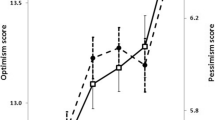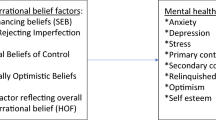Abstract
Explanatory style, the habitual way an individual explains the causes of bad and good events, is reliably associated with future health. In this article, we review evidence from three studies which demonstrate a significant relationship between pessimism (the belief that bad events are caused by internal, stable, and global factors and good events are caused by external, unstable, and specific factors) and an increased risk for infectious disease, poor health, and early mortality. We suggest two possible mechanisms which might mediate the link between pessimism and poor health. Finally, we propose that interventions aimed at changing a pessimistic outlook might lower the probability of future illness.
Similar content being viewed by others
References
Abramson, L.Y., Seligman, M.E.P., & Teasdale, J.D. (1978). Learned helplessness in humans: Critique and reformulation.Journal of Abnormal Psychology, 87, 49–74.
Alloy, L.B., Peterson, C., Abramson, L.Y., & Seligman, M.E.P. (1984). Attributional style and generality of learned helplessness.Journal of Personality and Social Psychology, 46, 681–687.
Anderson, C.A., Horowitz, L.M., and French, R. (1983). Attributional style of lonely and depressed people.Journal of Personality and Social Psychology, 45, 127–136.
Beck, A.T., Rush, A.J., Shaw, B.F., & Emery, G. (1979).Cognitive therapy of depression. New York: Guilford.
Cole, C.S., & Coyne, J.C. (1977). Situational specificity of laboratory induced learned helplessness.Journal of Abnormal Psychology, 86, 615–623.
Cronbach, L.J. (1951). Coefficient alpha and the internal structure of tests.Psychometrika, 16, 279–334.
Dohrenwend, B.S., & Dohrenwend, B.P. (1974).Stressful life events: Their nature and significance. New York: Wiley.
Golin, S., Sweeney, P.D., & Schaeffer, D.E. (1981). The causality of causal attributions in depression: A cross-lagged panel correlational analysis.Journal of Abnormal Psychology, 90, 14–22.
Greer, S., Morris, T., & Pettingale, K.W., (1979). Psychological response to breast cancer: Effect on outcome.Lancet, 2, 785–787.
Hiroto, D. (1974). Locus of control in human learned helplessness.Journal of Experimental Psychology, 192, 187–193.
Hiroto, D.S., & Seligman, M.E.P. (1975). Generality of learned helplessness in man.Journal of Personality and Social Psychology, 31, 311–327.
Kamen, L.P., & Seligman, M.E.P. (1987). Explanatory style predicts college grade point average. Unpublished manuscript, University of Pennsylvania.
Kamen, L.P., Seligman, M.E.P., Dwyer J. & Rodin, J. (1987). Pessimism and cell-mediated immunity. Unpublished Manuscript, University of Pennsylvania.
Kiecolt-Glaser, J.K., Garner, W., Speicher, C., Penn, G.M., Holliday, J., & Glaser, R. (1984). Psychosocial modifiers of immunocompetence in medical students.Psychosomatic Medicime, 46, 7–14.
Kiecolt-Glaser, J.K., Glaser, R., Williger, D., Stout, J., Messick, G., Sheppard, S., Ricker, D., Romisher, C., Briner, W., Bonnell, G., & Donnerberg, R. (1985). Psychosocial enhancement of immunocompetence in a geriatric population.Health Psychology, 4, 25–41.
Kiecolt-Glaser, J.K., Ricker, D., Messick, G., Speicher, C.E., Garner, W., & Glaser, R. (1984). Urinary cortisol cellular immunocompetency and loneliness in psychiatric inpatients.Psychosomatic Medicine, 46, 15–24.
Langer, E.J., & Rodin, J. (1976). The effects of choice and enhanced personal responsibility for the aged: A field experiment in an institutional setting.Journal of Personality and Social Psychology, 34, 191–198.
Laudenslager, M.L., Ryan, S.M., Drugan, R.C., Hyson, R.L., & Maier, S.F. (1983). Coping and immunosuppression: Inescapable but not escapable shock suppresses lymphocyte proliferation.Science, 221, 568–570.
LeShan, L. (1966). An emotional life-history pattern associated with neoplastic disease.Annals of the New York Academy of Sciences, 125, 780–793.
Levy, S.M. (1984). The expression of affect and its biological correlates: Mediating mechanisms of behavior and disease. In C. VanDyke, L. Temoshok, L.S. Zegans (Eds.),Emotions in health and illness: Applications to clinical practice. Orlando, Fla.: Grune & Stratton.
Levy, S.M. (1986). Behavior as a biological response modifier: The psychoimmunoendocrine network and tumor immunology.Behavioral Medicine Abstracts, 6, 1–5.
Maier, S.F., & Seligman, M.E.P. (1976). Learned helplessness: Theory and evidence.Journal of Experimental Psychology: General, 105, 3–46.
Metalsky, G.I., Abramson, L.Y., Seligman, M.E.P., Semmel, A., & Peterson, C. (1982). Attributional styles and life events in the classroom: Vulnerability and invulnerability to depressive mood reactions.Journal of Personality and Social Psychology, 43, 612–617.
Nolen-Hoeksema, S., Girgus, J.S., & Seligman, M.E.P. (1986). Learned helplessness in children:: A longitudinal study of depression, achievement, and explanatory style.Journal of Personality and Social Psychology, 51, 435–442.
Overmier, B.J., & Seligman, M.E.P. (1967). Effects of inescapable shock and avoidance responding.Journal of Comparative and Physiological Psychology, 63, 28–33.
Peterson, C., Bettes, B.A., & Seligman, M.E.P. (1985). Depressive symptoms and unprompted causal attributions: Content analysis.Behavior Research and Therapy, 23, 379–382.
Peterson, C., Luborsky, L., & Seligman, M.E.P. (1983). Attributions and depressive mood shifts: A case study using the symptom-context method.Journal of Abnormal Psychology, 92, 96–103.
Peterson, C., & Seligman, M.E.P. (1984). Causal explanations as a risk factor for depression: Theory and evidence.Psychological Review, 91, 347–374.
Peterson, C., & Seligman, M.E.P. (1986). Content analysis of verbatim explanations: The cave technique for assessing explanatory style. Unpublished manuscript, University of Pennsylvania.
Peterson, C. & Seligman, M.E.P. (1987). Explanatory style and illness.Journal of Personality, 55, 237–265.
Peterson, C., Seligman, M.E.P., & Vaillant, G.E. (1987). Pessimistic explanatory style is a risk factor for physical illness.Journal of Personality & Social Psychology, in press.
Peterson, C., Semmel, A., von Baeyer, C., Abramson, L.Y., Metalsky, G.I., & Seligman, M.E.P. (1982). The attributional style questionnaire.Cognitive Therapy and Research, 6, 287–299.
Rodin, J. (1986). Aging and health: Effects of the sense of control.Science, 233, 1271–1275.
Rodin, J., & Langer, E.J. (1977). Long-term effects of a control relevant intervention with the institutionalized aged.Journal of Personality and Social Psychology, 35, 897–902.
Rodin, J., Timko, C., & Harris, S. (1985). The construct of control: Biological and psychosocial correlates. In P. Lawson & G. Maddox (Eds.),Annual review of gerontology and geriatrics. New York: Springer.
Schmale, A.H., & Iker, H.P. (1966a). The effect of hopelessness and the development of cancer. I. Identification of uterine cervical cancer in women with a typical cytology.Psychosomatic Medicine, 28, 714–721.
Schmale, A.H., & Iker, H.P. (1966b). The psychological setting of uterine cervical cancer.Annals of the New York Academy of Sciences, 125, 807–813.
Schulman, P., & Castellon, C. (1986). Guidelines for extracting and rating spontaneous explanations. Unpublished manuscript, University of Pennsylvania.
Schultz, R. (1980). Aging and control. In J. Garber & M.E.P. Seligman (Eds.),Human helplessness: Theory and applications. New York: Academic Press.
Seligman, M.E.P. (1975).Helpnessness: On depression, development, and death. San Francisco: Freeman.
Seligman, M.E.P., Abramson, L.Y., Semmel, A., & von Baeyer, C. (1979). Depressive attributional style.Journal of Abnormal Psychology, 88, 242–247.
Seligman, M.E.P., & Elder, G.H. (1985). Learned helplessness and life-span development. In A. Sorenson, F. Weinert, & L. Sherrod (Eds.),Human development and the life course: Multidisciplinary perspectives (pp. 377–427). Hillsdale, N.J.: Erlbaum.
Seligman, M.E.P., & Maier, S.F. (1967). Failure to escape traumatic shock.Journal of Experimental Psychology, 74, 1–9.
Seligman, M.E.P., Maier, S.F., & Geer, J.H. (1968). Alleviation of learned helplessness in the dog.Journal of Abnormal Psychology, 73, 256–262.
Seligman, M.E.P., Maier, S.F., & Solomon, R.L. (1971). Unpredictable and uncontrollable aversive events. In F.R. Brush (Ed.).Aversive conditioning and learning. New York: Academic Press.
Seligman, M.E.P., Peterson, C., Kaslow, N.J., Tanenbaum, R.L., Alloy, L.B., & Abramson, L.Y. (1984). Explanatory style and depressive symptoms among children.Journal of Abnormal Psychology, 93, 235–238.
Seligman, M.E.P., & Schulman, P. (1986). Explanatory style as a predictor of productivity and quitting among life insurance sales agents.Journal of Personality and Social Psychology, 50, 832–838.
Sklar, L.S., & Anisman, H. (1979). Stress and coping factors influence tumor growth.Science, 205, 513–515.
Sweeney, P.D., Anderson, K., & Bailey, S. (1986). Attributional style in depression: A meta-analytic review.Journal of Personality and Social Psychology, 50, 974–991.
Tennen, H., & Herzerberger, S. (1986). Attributional style questionnaire. In D.J. Keyser & R.C. Sweetland (Eds.).Test critiques. Volume 4. Kansas City: Test Corporation of America.
Visintainer, M.A., Volpicelli, J.R., & Seligman, M.E.P. (1982). Tumor rejection in rats after inescapable versus escapable shock.Science, 216, 437–439.
Author information
Authors and Affiliations
Additional information
Supported by a National Science Foundation Graduate Fellowship to Leslie P. Kamen; U.S. Public Health Service Grant MH-19064 and National Institute of Aging Grant AG05590 to Martin E. P. Seligman; U.S. Public Health Service Grant MH40142-01A1 to Martin E.P. Seligman, Joan S. Girgus, and Susan Nolen-Hoeksema. Supported in part by the MacArthur Foundation Research Network on Determinants and Consequences of Health-Promoting and Health-Damaging Behavior.
Rights and permissions
About this article
Cite this article
Kamen, L.P., Seligman, M.E.P. Explanatory style and health. Current Psychology 6, 207–218 (1987). https://doi.org/10.1007/BF02686648
Published:
Issue Date:
DOI: https://doi.org/10.1007/BF02686648




